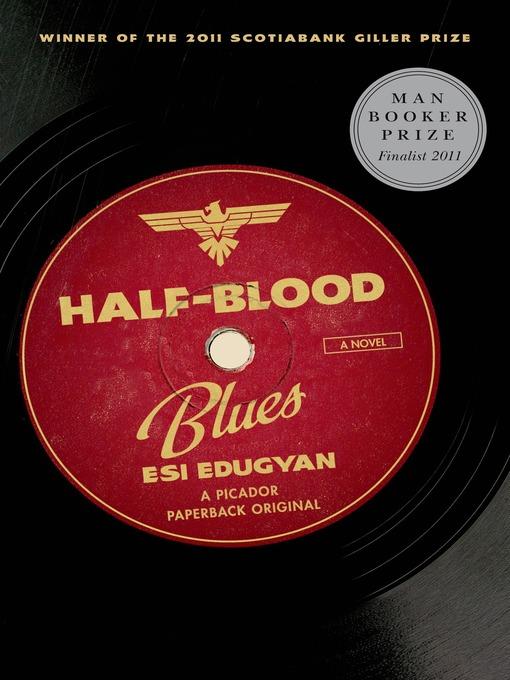
Half-Blood Blues
A Novel
کتاب های مرتبط
- اطلاعات
- نقد و بررسی
- دیدگاه کاربران
نقد و بررسی

Starred review from January 2, 2012
Edugyan’s second novel, shortlisted for the 2011 Man Booker Prize, pays a mournful tribute to the Hot-Time Swingers, a once-legendary six-piece German-American multiracial jazz ensemble gigging in Berlin on the eve of WWII. When the pianist is picked up by the Gestapo, the remaining members flee to Paris with forged passports to meet Louis Armstrong in hopes of cutting a record. After the German occupation of Paris, “the Boots” arrest Hieronymous (“Hiero”) Falk, the band’s 20-year-old-genius Afro-German trumpet player, leaving the band with one half-finished record, one shattered love affair, and one too many secrets. The story of the band’s demise and partial resurrection, as seen through the eyes of Sid Griffiths—the upright bass player—unfolds in richly scripted vignettes alternating between 1939/1940 (when Hiero disappears) and 1992 (when Sid and Chip Jones, the percussionist, revisit Berlin for a Hieronymous Falk festival and walk down memory lane). By the book’s end, readers will have pieced together most of the truth behind Sid’s biased recounting of events, but nothing will prepare them for the disclosure of an ultimate betrayal. While the rarely explored subject adds to the book’s allure, what stands out most is its cadenced narration and slangy dialogue, as conversations, both spoken and unspoken, snap, sizzle, and slide off the page. Sid’s motivation can feel obscure, but his lessons learned are hard-won all the same. Agent: Anne McDermid, Anne McDermid Associates.

February 1, 2012
In Edugyan's second novel, finalist for the 2011 Man Booker Prize, some jazz musicians find their music and lives endangered in Nazi Germany and occupied Paris. Paris 1940. Nazis everywhere. The musicians are huddled in a shabby apartment. One of them, without papers, goes out on a reckless search for milk. Bam! He's arrested and deported to a German camp. Edugyan (a Canadian of Ghanaian descent) has incorporated the novel's climax in this taut opening. Just who are these guys? Two of them, the well-delineated Sid Griffiths and Chip Jones, are lifelong friends from Baltimore. Chip the drummer is black; Sid, the bass player and narrator, is fair enough to pass for white. (He refuses.) They arrived in swinging Berlin in the 1920's and joined forces with three German players. Years later, one of the Germans discovered a jazz prodigy, Hieronymus Falk, the kid (he's barely 20). Trumpeter Hiero fronts for the band and is the central character. He's mixed race (African father, German mother), but it's hard to remember he's German when we only hear him use black American slang (overdone). He's also a student of the classics and reads Herodotus. All this is a heavy burden for young shoulders, and it's hard to locate the individual inside the mystique. That mystique, however, causes Louis Armstrong, in 1939, to summon Hiero and the band to Paris to cut a record. His emissary is the beautiful, light-skinned singer Delilah, with whom Sid falls disastrously in love. Another disaster ensues when he messes up at the recording session; but Hiero soars, leading Satchmo to call him Little Louis. There is some sag in the second (Parisian) half, as Sid stews in self-pity and jealousy of Hiero, before the latter's deportation. A coda, awkwardly interpolated, finds Sid and Chip in Berlin in 1992, where shocking allegations in a documentary on Hiero test their friendship. A memorable evocation of the defiant thrill of jazz at a terrible time.
COPYRIGHT(2012) Kirkus Reviews, ALL RIGHTS RESERVED.

Starred review from January 1, 2012
Short-listed for the Booker Prize, Canadian Edugyan's second novel jumps between Berlin and Paris in 193940 and Berlin in 1992 to tell the story of a German American jazz band and its star trumpeter, Hieronymous Falk. Having hit it big during the Weimar era, the banda mixture of expat African Americans and German jazz fanatics, including Falk, who is both black and a German (a mischling, or crossbreed, in the eyes of the Nazis)now faces tough and increasingly dangerous times in the wake of Hitler's ban against degenerate music. Drummer Chip Jones and bassist Sid Griffiths, both African Americans, escape to Paris, but Falk is arrrested in Berlin. Cut to 1992: the discovery of the band's unreleased last recording, Half-Blood Blues, a jazz version of the Horst Wessel Song, the Nazi party anthem, has made a music legend of Falk, never heard from after the war and presumed dead, and has prompted a celebratory documentary, which will premier in Berlin. Edugyan tells this incredibly rich story of music, politics, and personal betrayal both subtly and dramatically, unveiling the mystery of what happened to Falk as she exposes the tensions between the band members and the secret that has been gnawing at one of them for half a century. Like Paule Marshall's The Fisher King (2000), which tells a similar story of an expat jazzman and his troubled legacy, Edugyan's novel mixes palpable period atmosphere with an interpersonal drama of great emotional depth. That narrow moment in time when the freewheeling decadence of Weimar Germany gave way to jackbooted tyranny has been the subject of much fine fiction, but Edugyan is the first to overlay it with jazz history. It makes a sublime marriage.(Reprinted with permission of Booklist, copyright 2012, American Library Association.)

























دیدگاه کاربران